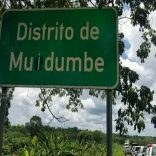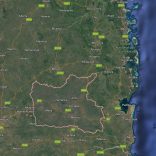Mozambique: One killed by terrorists in Magaia village - AIM report
“Hidden debts” trial: September 9 2021 – AIM reports

File photo: Lusa
Trial remains public, insists judge
Judge Efigenio Baptista, of the Maputo City court, on Thursday insisted that the current trial of 19 people accused of crimes in connection with Mozambique’s “hidden debts” scandal must remain open to press and public.
The morning session began with a call by Alexandre Chivale, the lawyer for several defendants, including Ndambi Guebuza, the oldest son of former President Armando Guebuza, to limit public broadcasting of the trial.
He was speaking just before judge Baptista was due to question Ines Moiane, the private secretary of Guebuza, who remains an adviser to the former president to this day. Moiane certainly has a great deal of knowledge about the inner workings of the Guebuza presidency.
Chivale, who is also representing Moiane, called on the court to prevent television and radio stations from broadcasting her image or her voice in order “to defend her honour and her good name”.
Defence lawyers had made similar calls right at the start of the trial, and Baptista had rejected them.
“The question of the public nature of this trial has already been discussed, and I don’t know why you are coming back to it”, said the judge. The defence could raise the matter again, but he had no intention of changing his mind.
“You can ask a thousand times, but the court is not going to alter its decision. This trial is public”, he declared.
A second defence lawyer, Isalcio Mahanjane, claimed that parts of the pre-trial proceedings were invalid, because the defendant concerned, Bruno Langa, a close friend of Ndambi Guebuza, had been represented by a person who is not a member of the Mozambique Bar Association, and therefore does not qualify as a real lawyer.
Mahanjane wanted the judge to scrub from the record the initial interrogation of Bruno at the Attorney-General’s Office (PGR) in January 2019, and his questioning by investigating magistrate Delio Portugal the following month.
Although it seems true that the man representing Langa on both occasions, Paulo Nhancale, was indeed not a member of the OAM (and could thus be in serious trouble for impersonating a lawyer), the prosecuting attorney Sheila Marrangula, argued that this did not invalidate either of the interrogations that Mahanjane wanted scrubbed.
When Langa was questioned at the PGR he was not yet under arrest, and the Penal Procedural Code make it obligatory for suspects to be represented by a lawyer or a public defender only when they are under arrest. Suspects who have not been detained may bring a lawyer or not, as they like.
But Langa should have been represented by a qualified lawyer at his interrogation by magistrate Delio Portugal. However, shortly afterwards he hired a recognised lawyer, who did not protest the validity of the interrogation within the five days allowed by the Procedural Code. This meant that the irregularity had been purged, said Marrengula.
Guebuza’s private secretary insists she was not bribed
Ines Moiane, the private secretary of former Mozambican President Armando Guebuza, on Thursday admitted to receiving 750,000 euros from the Abu Dhabi based Privinvest group, but denied this was a bribe.
On the 11th day of the trial of 19 people in connection with the scandal of Mozambique’s “hidden debts”, Moiane, who was Guebuza’s secretary from 2005 to 2015, told the Maputo City Court that she had been present at “five or six” meetings, in Mozambique and abroad, between Guebuza and senior Privinvest official Jean Boustani.
Boustani is a pivotal figure in the scandal since he channelled the bribes from Privinvest to Mozambican officials and to corrupt managers from the Credit Suisse bank. Credit Suisse and the Russian bank VTB, in 2013 and 2014 lent 2.2 billion dollars to three fraudulent Mozambican companies, Proindicus. Ematum (Mozambique Tuna Company) and MAM (Mozambique Asset Management) on the basis of illicit loan guarantees issued by the Guebuza government.
Moiane claimed that her deal with Boustani centred on a plot of land, near the Maputo beach, where Privinvest wanted to build a hotel or a block of flats. She said she had applied for this land to Maputo Municipal Council and was granted land use rights (known as a DUAT) in 2011. According to the DUAT, she was entitled to build a block of between three and 33 storeys on the land.
But Moiane did not have the money for this investment, and so she spoke to Boustani, who said Privinvest would be interested in building on the land. Initially, the proposal was that, if an apartment block was built on the land, five, or maybe three, of the apartments would be given to Moiane. But eventually monetary payment was agreed: Privinvest would pay Moiane 750,000 euros.
Right from the start here was something wrong about this story. Anyone who applies for a DUAT must tell the municipality what they intend to do with the land. But in the decade since Moiane’s DUAT was issued, nothing at all has been built on the land, and to this day it remains vacant
She said Boustani wanted to deal with companies, not individuals. So she approached her friend Sergio Namburete who obligingly set up a company, CEN Consultancy and Investments, with a bank account in euros, to receive the Privinvest money.
Asked why she did not set up a company herself, rather than relying on Namburete, she said “because it’s not my area. I don’t know anything about civil construction”.
CEN signed a contract with Logistics International, part of the Privinvest group, and the latter then sent 877,500 euros to the CEN account. Namburete sent 750,000 euros on to Moiane, and kept the rest.
The judge, Efigenio Baptista, pointed out that the contract made no mention of Moiane’s plot of land, or what would be built on it. “I don’t know how to explain why the land is not mentioned in the contract”, replied Moiane.
For the prosecution, the answer is simple: Boustani just needed a way of channelling a bribe to Moiane, and never had any intention of building a hotel or an apartment block on Moiane’s land.
She said the land is still in her name, but is “in the possession” of Privinvest – although nobody from Privinvest had ever set foot there. Moiane added that, in 2015, Boustani had told her the real estate development would go ahead as soon as the audit company Kroll had finished its investigation of Proindicus, Ematum and MAM.
This time line is impossible – the scandal did not become public until April 2016 when an article in the “Wall Street Journal” revealed the full extent of the illicit loans. The Kroll audit did not take place until 2017.
As Namburete admitted, when he testified on Monday, the CEN euro account was used only to receive the Privinvest money. No other funds were deposited, and the account has remained dormant.
Moiane laundered her 750,000 euros in the purchase of two flats in central Maputo. She asked her adopted son, Elias Moiane, to handle the purchase, with the result that he too was arrested and accused of money laundering.
As the day wore on, Ines Moiane increasingly answered questions, particularly from the prosecutor, Sheila Marrangula, with the words “I don’t know” or “I can’t remember”. Several questions, particularly those concerning her relationship with Boustani, she refused to answer at all (which is her prerogative, but those listening may draw their own conclusions).
She said she could not remember who else had been on the presidential delegation to Abu Dhabi, or what the purpose of that visit had been.
Asked by the Mozambican Bar association, which is assisting the public prosecutor in the trial, whether she had declared the 750,000 euros to the Mozambican tax authorities, she replied “I didn’t know I had to declare it”.
Although Guebuza left the Presidency in 2015, Moiane continued working for him and now describes herself as an adviser to the former president.












Leave a Reply
Be the First to Comment!
You must be logged in to post a comment.
You must be logged in to post a comment.